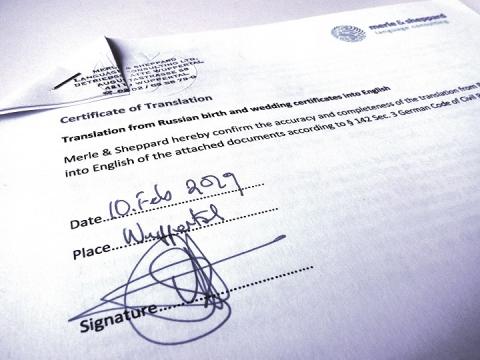
When getting your documents translated it is essential to know when and how they should be certified. Normally, translations don’t need to go through this process. Translated text such as website content, company documentation and marketing articles etc. are generally sufficient for readers without certification.
However, there are times when a certified translation is mandatory and required by major authorities for official and legal purposes. Personal documents such as wedding, birth or death certificates, university qualifications or medical records often need this form of certification i.e. the translator or language service provider must stamp and certify that the translation is a true, complete and accurate record of the original.
The certificate of accuracy is attached to the translation which then has legal standing and can be used for official purposes. Immigration departments typically require certified translations of this kind done by professional translators.
What else needs to be considered?
The translator or language service provider must personally sight the original documents to verify that the translation is based on the original document. A certificate has to have the translator’s name, signature, address and date of certification. Possessing recognized professional qualifications and having passed the appropriate exams is also essential for the translator’s accreditation.
Authorities from state to state and country to country may have different requirements. For instance, there may be a time limit i.e. the certification must be less than three months old, or it might be valid only in one state, but not another, so it pays to ask the relevant authority well in advance. And, the certificate is often sent by post or courier hence a few extra days are needed for this process. For urgent translations and emergencies Merle & Sheppard therefore offer faster, overnight service.
When is a notarized translation needed?
A notary public is a person authorized to authenticate specific legal formalities such as buying a house or writing a last will and testament. In this case anyone translating the documents can swear the text is accurate by signing an affidavit, with the limitation that there is no quality guarantee. The notary public does not evaluate the translated content for accuracy, but instead verifies that the translator’s identity and signature are authentic.
In some countries both a certified and notarized translation are essential. This is a common practice in the United States especially for immigration documents. When this is the case the process can take longer than expected so do allow plenty of time for the processing of your translations.
Contact Merle & Sheppard
... if you need any advice it’s worth asking us in advance as we have considerable experience in the certification of translations.



